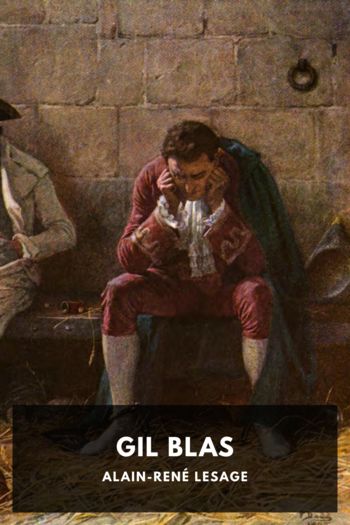Gil Blas - Alain-René Lesage (online e book reader .txt) 📗

- Author: Alain-René Lesage
Book online «Gil Blas - Alain-René Lesage (online e book reader .txt) 📗». Author Alain-René Lesage
“They told you no more than the truth,” replied I; “the delightful vision of political eminence wherein you left me last, soon shifted the scene of my incoherent dreams to a prison and complete destitution. But for all that, my friend, here you behold me again in a better plight than ever.”
“That is quite out of the question,” said Núñez: “your deportment is discreet and decent; you have not that supercilious and devil-take-the-hindmost sort of aspect which good keep communicates to the human face.”
“The reverses of this checkered life,” replied I, “have brought me down to the level of the more modest virtues; I have taken a lesson in the school of adversity, to enjoy the possession of a good stud without riding the great horse.”
“Tell me then candidly,” cried Fabricio, raising his head upon his hand with his elbow upon the pillow, “what your present occupation can possibly be. A steward perhaps to some nobleman out at elbows, or man of business to some rich widow!”
“Something better than either the one or the other,” rejoined I; “but excuse me from saying more at present: another time your curiosity shall be satisfied. It is enough at present to assure you that my means are equal to my inclination, and that you may command independence through me; but then you must submit to an embargo on your wit, and a non-intercourse act between you and the faculty of writing, whether in verse or prose. Can you make this sacrifice to my friendship?”
“I have already made it to the powers above,” said he, “in my last critical sickness. A Dominican made me forswear poetry, as an amusement bordering on criminality, but at all events beside the turnpike-road of good sense.”
“I wish you joy, my dear Núñez,” replied I; “but beware of a revoke.”
“There is not the least danger on that head,” rejoined he: “the Muses and I have agreed on terms of separation: just as you came in at that door, I was conning over a farewell ode.”
“Good Master Fabricio,” said I, with a wise swagging to and fro of my head, “it is a doubtful question whether your vow of abjuration ought to pass current with the Dominican and myself: you seem over head and ears in love with those virgins incarnate.”
“No, no,” contended he peevishly, “I have cut the connection asunder. Nay, more, I have quarrelled with their keepers, the public. The readers of these days do not deserve an author of more genius than themselves: I should be sorry to write down to their comprehension. You are not to suppose that this is the language of disgust; it is my sincere and well-weighed opinion. Applause and hisses are just the same to me. It is a toss up who fails and who succeeds: the wit of today is the blockhead of tomorrow. What cursed fools our dramatists must be, to care for anything but their poundage when their plays happen to be received! It is all very well for a few nights! But only fancy a revival at the end of twenty years, and what a figure they will cut then! The audiences of the present day turn up their noses at the stock pieces of the last age, and it is a question whether their taste will fare better with their more critical descendants. If that conjecture be probable, the inventors of clap-traps now will be the butt of catcalls hereafter. It is just the same with novel writers, and all other manufacturers of unnecessary literature; they strut and fret for an hour, and then are no more seen or heard of. The glories of successful authorship are the mere vapors of a murky atmosphere, meteors of a marsh, foul coruscations of a dunghill, cathedral tapers to put out the galaxy, blue flames of coarse paper held over a candle.”
Though these caricatures of rival renown were the mere creations of jealousy in the poet of the Asturias, it was not my business to correct his ill temper. “I am delighted,” said I, “that wit and you have had so serious a quarrel, and that the diarrhoea of your inventive faculties has been cured by an astringent. You may depend on it, I will put you in the way of a good livelihood, without drawing deep upon your intellectual credit.”
“So much the better,” cried he; “wit smells like carrion in my nostrils, or rather like a pungent and deleterious perfume; fragrant to the sense, but corrosive to the vitals.”
“I heartily wish, my dear Fabricio,” resumed I, “that you may always keep in that mind. Only wash your hands completely of poetry, and, you may depend on it, I will enable you to keep your head above water without picking or stealing. In the mean while,” added I, slipping a purse of sixty pistoles into his hand, “accept this as a slight instance of my regard.”
“O friend like the friends in days of yore,” cried the son of barber Núñez, out of his wits with joy and gratitude, “it was heaven itself which sent you into this hospital, whence your goodness is now discharging me!” Before we parted, I gave him my address, and invited him to come and see me as soon as his health would permit. He opened his eyes as an oyster does its shell, when I told him that I lodged under the minister’s roof. “O illustrious Gil Blas!” said he, “great as Pompey and fortunate as Sylla, whose lot it is to be hand in glove with the dictators of modern times! I rejoice most disinterestedly in your good fortune, because it is so very evident what a noble use





Comments (0)